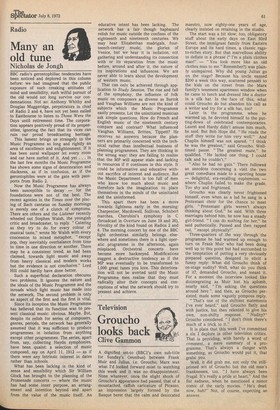Television
Grouch() looks back
Clive Gammon
A dignified set-to (BBC1's own sub-title for Sunday's Omnibus) between Frank Muir and Julius, i.e. Groucho, Marx was what I'd looked forward most to watching this week and it was no disappointment. None whatever, once the slight shock of Groucho's appearance had passed, that of a moustached, raffish caricature of Picasso, an impression largely formed by the Basque beret that the calm and desiccated
maestro, now eighty-one years of age, clearly insisted on retaining in the studio.
The start was a bit slow, too, obligatory stuff about the early days on East 93rd Street, the immigrant family from Eastern Europe and its hard times, a classic ragsto-riches story. But that marvellous ability to deflate in a phrase (" I'm a plain clothes man!" — "You look more like an old clothes man to me." Remember?) was plainly unimpaired. Why did young Julius go on the stage? Because his uncle earned $200 a week this way, scattered pennies to the kids on the street from the Marx family's tenement apartment window when he came to lunch and dressed like a doctor in a silk hat. In the face of this, what could Groucho do but abandon his call as a writer and try for a silk hat, too?
Later in the programme, when he warmed up, he devoted himself to the putting-down of celebrated contemporaries. Laurel and Hardy didn't amuse him much, he said. But Bob Hope did. "He reads the stuff they write for him very well." And Chaplin himself was not spared. "I think he was the greatest," said Groucho. Welltimed pause. "The greatest mute," he qualified. "He lacked one thing. I could talk and he couldn't."
"Also he had no guts." There followed an anecdote concerning a visit the two great comedians made to a sporting house — delightful, era-recalling euphemism — where Chaplin failed to make the grade. Too shy and frightened.
Groucho was clearly never frightened himself, even when as a lad he sang in a Protestant choir for the chance to meet girls. "Protestant girls weren't always thinking about God," he said. With three marriages behind him, he now has a steady girl-friend. "1 can do nothing for her," he said pathetically. Paused and then rapped out, "except physically!"
Three-quarters of the way through the programme he had warmed up enough to turn on Frank Muir who had been doing well up to this point but had succumbed to the temptation of putting a very obviously prepared question, designed to elicit a funny reply: What did Grouch() think of on-stage nudity? Well, what do you think of it?, demanded Groucho, and meant it. For a moment the interview looked like disintegrating as Muir lost his aplomb, nearly said, "I'm asking the questions around here ", and then, as Groucho persisted, made some vaguely pompous reply.
"That's one of the shiftiest statements I've ever heard," said Groucho flatly and with justice, but then relented to give his own, non-shifty response. "Nudity?" Groucho considered. "I don't think there's much of a trick to it."
It is plain that this week I've committed a sin I deplore in other television critics. That is providing, with barely a word of comment, a mere summary of a programme. That's always a danger with something, as Groucho would put it, that grabs you.
Well, it did grab me, not only the stillprimed wit of Groucho but the old man's franknesses, too. "I have always been frugal. It's really a pride at heart." And the flat sadness, when he mentioned a minor comic of the early movies. " He's dead, now, huh?" Not, of course, expecting an answer.










































 Previous page
Previous page